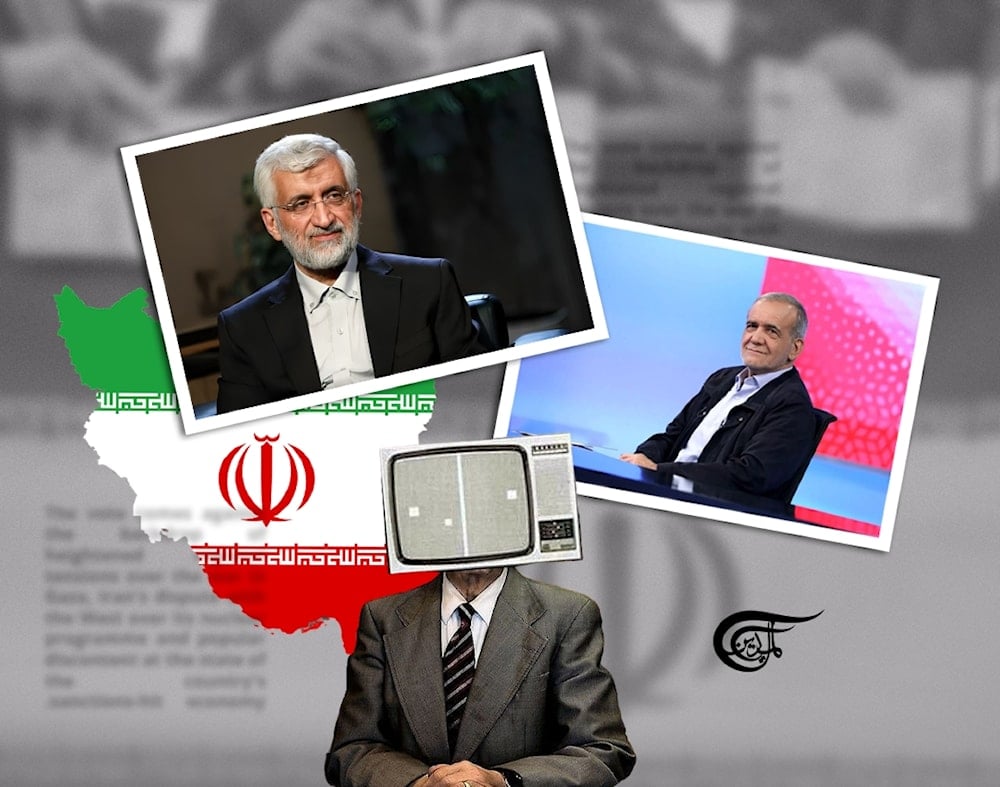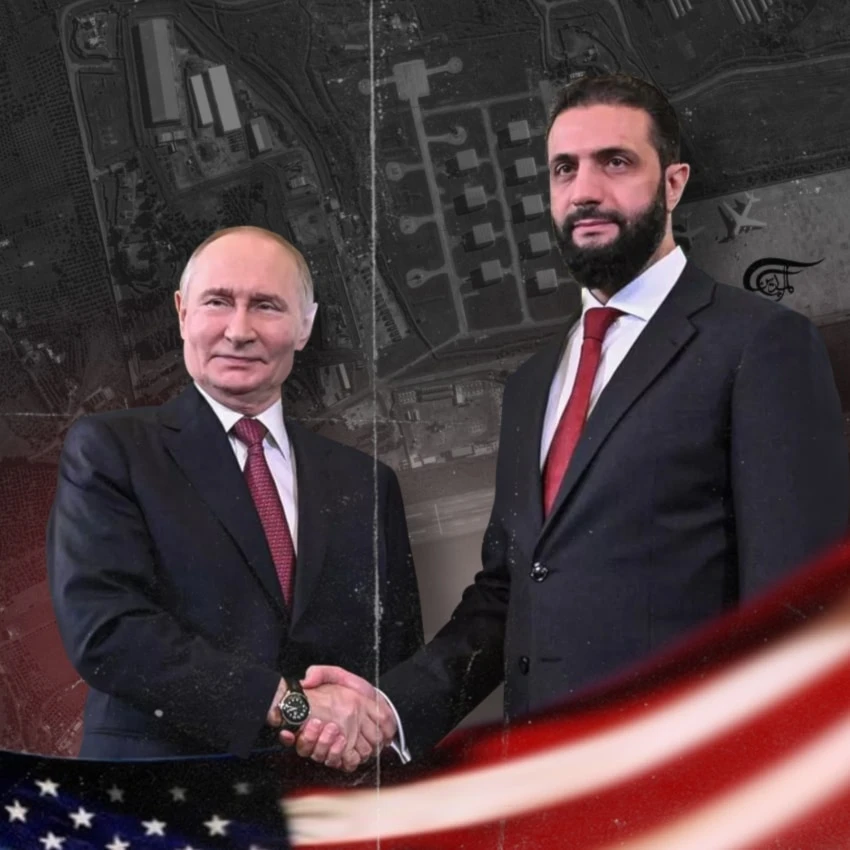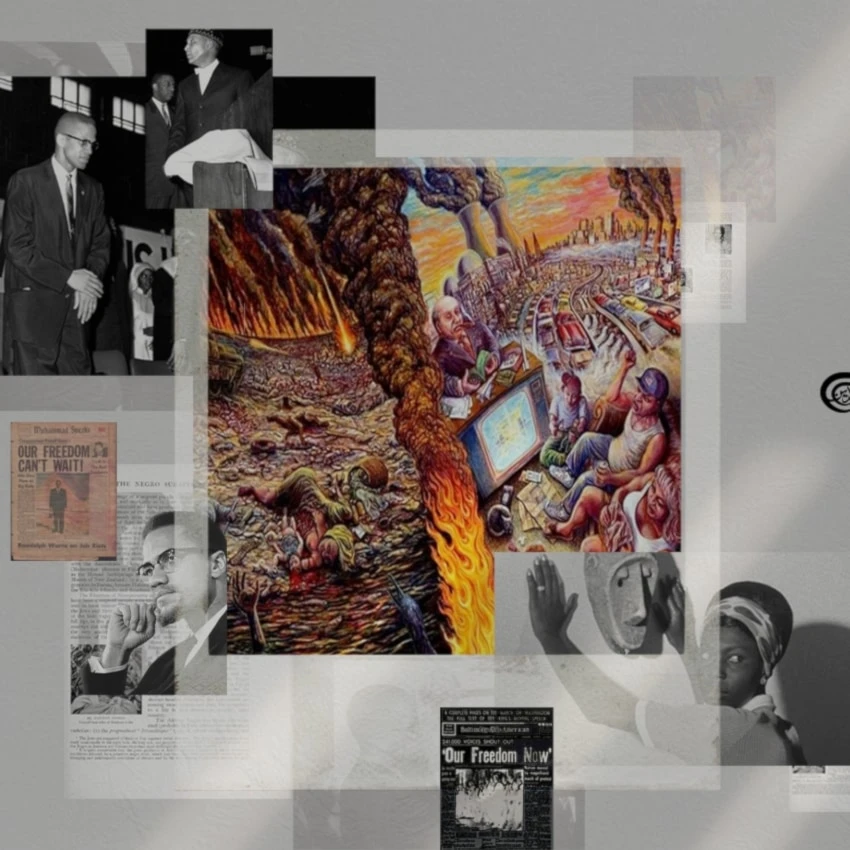Western media is reading too much into Iran's elections, but for all the wrong reasons
Western analysts and the US media consistently make incorrect assumptions about Iran, often based on incorrect readings of the Iranian political scene.
-

Western analysts and the US media consistently make incorrect assumptions about Iran based on voter turnout. (Al Mayadeen English; Illustrated by Batoul Chamas)
The Iranian presidential elections demonstrate Iran’s strong and passionate desire to promote genuine democratic traditions in the country, defying the Western disinformation campaign about cynicism among Iranian voters.
The official results announced by the Iranian authorities following the first round reveal that Masoud Pezeshkian got 10.4 million votes, while Saeed Jalili received 9.4 million in the June 28 election. Parliament speaker Mohammad Bagher Ghalibaf secured the third position with 3.3 million votes, while religious scholar Mostafa Pourmohammadi secured over 206,000 votes.
Since none of the candidates got the threshold votes, a runoff phase on Friday, June 5, is set to decide the fate of the two main candidates. To avoid a runoff phase, Iran's electoral procedure requires that a presidential candidate secure at least 50% of votes.
Ghalibaf, a former general in Iran’s paramilitary Revolutionary Guard and national police chief, has endorsed the candidature of Jallili, which, analysts say, consolidated his position. Analysts are tipping former nuclear negotiator Saeed Jalili, a 58-year-old Iranian diplomat known for his sacrifices in the 1980s Iran-Iraq war, as the potential next Iranian president, succeeding President Ebrahim Raisi, who lost his life along with his close companions in a helicopter crash in May.
Turnout
Although a 40% turnout is incommensurate with the historic 98.2% recorded during the 1979 referendum for the establishment of the Islamic Republic, the announcement of the low turnout is in itself an indication that Iran is transparent regarding its elections.
Sayyed Ali Khamenei, the leader of the Revolution and the Islamic Republic, expressed his apprehension over the low voter participation and encouraged the Iranian populace to actively engage in the presidential runoff election scheduled for July 5.
"Individuals who have a strong affinity for Islam, the Islamic Republic, and the advancement of the country should demonstrate their support by actively participating in the elections," emphasizes Sayyed Khamenei.
Simultaneously, he rejected the Western media's presumption that the lower turnout was due to the unfavorable perception of Iranian authorities. The Iranian leader refuted the media's interpretation, asserting that it is completely erroneous to assume that those who did not vote in the first round of the presidential election are against the government.
Voter turnout in the first phase of the Iranian elections, held at a time when the occupation forces were closely evaluating a strike on Lebanon, was low for various reasons. The poor state of the Iranian economy and crippling inflation in the country did lead to a slowdown in voter turnout at the polling stations.
These sanctions have had a devastating impact on the Iranian economy, resulting in widespread inflation. The drastic devaluation of the rial has severely impacted the average Iranian. Years of depreciation squeezed the value of their bank accounts, retirement funds, and other holdings.
However, Western analysts and the US media consistently make incorrect assumptions based on voters' turnout. They argue that the turnout suggests that the majority did not support the policies pursued by the Iranian leadership, which is wrong.
The low turnaround in the presidential election may well be justified, given the long-term economic limitations and sanctions imposed unjustifiably on Iran by the US and its Western allies.
The preparations for the 2024 elections took place during a period of severe economic slowdown, export restrictions, and crippling inflation, resulting in unprecedented harm to the oil-dependent economy. Six weeks after the tragic air crash that claimed the lives of the former Iranian president and his colleagues, the first phase of the polls took place. The atmosphere surrounding the election has somewhat dampened the sentiments of Iranian voters, but overall, they have shown enthusiasm in the election process and demonstrated their resolve to uphold the norms of democracy.
Geopolitical ramifications
From a geopolitical standpoint, the Iranian elections would have significant implications for regional and Middle Eastern politics. Analysts forecast a forthcoming regional confrontation if the Zionist state persists in making repeated threats against Lebanon. A candidate like Jalili coming into power would intensify Iran's foreign policy stance.
The June 28 presidential elections in Iran have generated worldwide interest in the power and importance of the president's position in shaping Iranian policies. In Iran, the leader is the main decision maker in terms of consequential decisions on foreign policy, including nuclear negotiations, relations with the US, and military and security issues.
The Council on Foreign Relations, a US-based think tank specializing in U.S. foreign policy and international relations, has published an interview with Mohsen Milani, who is a professor at the University of South Florida and an authority on Iran.
Milani believes that the Iranian president's position plays a vital role in shaping domestic policy, especially in economic matters. He argues that the president's specific power, as exemplified by current and past presidents, can impact international relations and guide them toward a different path. He establishes a parallel between the presidencies of Mohammed Khatami and Mahmoud Ahmadinejad, highlighting that Khatami advocated for the cessation of uranium enrichment activities in 2003. However, Ahmadinejad subsequently reversed this position. "Therefore, we should not disregard these elections as a mockery or lacking in importance," he affirms.
In response to a query on potential geopolitical shifts following the election of a new Iranian president, Milani clarified that the Iranian president lacks authority over the military and security forces, including the power to designate their commanders and chiefs. These commanders and chiefs do not have to answer to him. The Iranian president does not have authority over matters of security, war, and peace, which fall within the purview of the leader.
Consequently, the appointment of a new president will not alter Iran's position in the Middle East, the US, Russia, China, or Palestine. The reformists aim to restore connections with Europe and the US and redirect Iran's nuclear policy, while the conservatives advocate for a more assertive approach against Western interference and prioritize relations with Russia and China.

 F.M. Shakil
F.M. Shakil
 6 Min Read
6 Min Read









